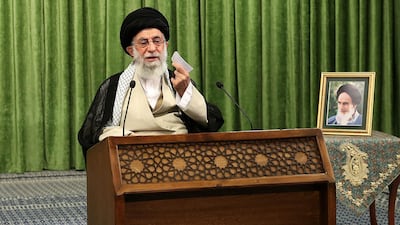Iran's supreme leader Ayatollah Ali Khamenei said on Friday that Tehran wanted to see action, not promises, to revive Tehran's 2015 nuclear deal with six world powers.
"I have told our negotiators that actions, not promises, are needed for the restoration of the nuclear deal," Mr Khamenei said in a televised speech to mark the 32nd anniversary of the death his predecessor, Ayatollah Ruhollah Khomeini.
Iran and global powers have been in talks since early April to bring the United States back into the pact and return Tehran to full compliance with the deal.
Mr Khamenei also touched on Iran's presidential election this month, which is facing calls for a boycott after only conservative and hardline candidates were permitted to run.
He urged people to participate in the June 18 vote, saying failure to do so would be a sin, according to Iran's Tasnim news agency.
The limiting of the field to just seven candidates is expected to boost the prospects of Ebrahim Raisi, the head of Iran's judiciary who is close to Mr Khamenei, but has added to public discontent over an economy hit by US sanctions and the Middle East's largest coronavirus outbreak.
President Hassan Rouhani, who has served the two consecutive terms allowed under the constitution, and his moderate allies blame most of Iran's economic woes on the US sanctions and have given top priority to reviving the 2015 nuclear deal. Conservative and hardline allies of Mr Khamenei place the responsibility squarely on the government, and insist that Washington cannot be trusted to fulfil any accord.
Former US president Donald Trump in 2018 withdrew from the nuclear deal, officially known as the Joint Comprehensive Plan of Action, and reimposed sanctions lifted under the agreement.
In response, Tehran built up its stockpiles of enriched uranium beyond the limits set by the pact, enriching it to higher levels of purity and installing advanced centrifuges to speed up production.
Iran has pressured European Union members Britain, France and Germany – the remaining signatories to the pact with Russia and China – to take steps to counter the US sanctions, but with little success.
Washington entered indirect talks with Tehran to revive the deal after US President Joe Biden took office in January.
The EU envoy co-ordinating the talks said on Wednesday that he believed a deal would be struck at the sixth round in Vienna next week, but the US State Department expected further discussions would be needed.
"I think there's just about every expectation that there will be subsequent rounds beyond that,” State Department spokesman Ned Price said.
Iran's top negotiator in the talks, Deputy Foreign Minister Abbas Araqchi, said a number of key issues remained to be settled.
"All in all, we made good progress, but there are issues left, without which an agreement couldn't be reached, and which have yet to be decided," Iran's semi-official Fars news agency reported Mr Araqchi as saying after the fifth round of talks on Thursday.
"It is not us but the signatories to the [deal] and the United States that must take their own difficult decisions and adapt themselves to the positions of the Islamic Republic," he said.

